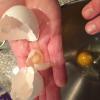September 19, 2016 - 17:00

I grew up in a house on the corner with a big backyard surrounded by gardens and a white fence. We were surrounded by three other yards, so we felt very cut off from the main roads; we loved to create our own mystical worlds. My younger brother and I used to gather large branches that fell from the pine trees, set them up around the biggest tree, and create teepees. We played games where we would sell guavas (balloons) from our own shops, and someone typically would end up crying because they stopped seeing the fun in having their fruit stolen. Most of our games revolved around being outside; we found all different types of forts in the bushes and if we couldn't find any, we would make them. We had an old wooden playset with swings as well, and we loved extending the world of possibilities that a playset has to offer. One that I distinctly remember: someone would swing while another would toss a kickball. The goal of the game was to kick the ball so fast and high that it went onto the roof, which I am proud to say occured quite often. The playset had a sandbox, which turned into an arid battlefield for green plastic army men and tanks. We used to play with them inside, but one can imagine how my mother would react when stepping on them more than a few times. I find it sad that the relationship I had with my siblings dissipated as I outgrew play. Until puberty, children thrive upon play - social interaction, creativity, imagination. But when hormones set in, children grow up. Play is not a priority anymore, because teens center their new world on romance. After romance comes school, jobs, college, friends. Play no longer becomes a priority. As the oldest child, I feel that I abandoned my three younger siblings, and my brother followed, and then my sister. Now my 9 year old sister has no one to play with at home, and I wish she had grown up with the experience of play that I had with three younger siblings.
